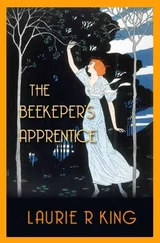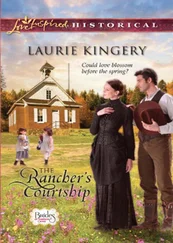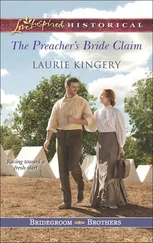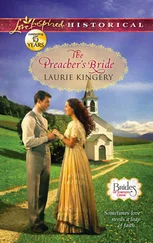“And I must compose an anonymous letter to Damian's lawyer in Paris, advising him that the police may call. Shall we meet back at my brother's?”
“How about the Café Royal instead?”
He raised his eyebrows. “We shall have our passports stamped for Bohemia. At one o'clock, then, Russell.”
On foot and by sardine-tin omnibus, my steps took me out of Westminster and past the Palace to the Brompton Road again, although not as far down as the meeting room for the Children of Lights.
Harrods is a meeting place for another kind of worship, that of excess in all its glory. Under the stoutest of circumstances, I can tolerate twenty minutes inside its decorative doors before my fingers begin to twitch and my eyes scan the endless halls for an exit. But then, I am not a person who considers browsing through shops a recreational activity.
Even with a specific objective in mind-ladies' shoes-it did not prove simple. Did I wish walking shoes, riding boots, ballet flats, shoes for the hunt, shoes for tennis-ah, heeled dress shoes. Daytime, evening wear, or for Court?
I eventually tracked down the department featuring the Cardiff designer: There sat the shoe, glossy and unsullied by grass or bloodstains, the small, pointless bow at the back a bit of frippery that should have looked pathetic but instead struck me as oddly brave. One of the VAD nurses I knew during the War had painted her lips with care each morning before stepping onto the ward, to cheer up the boys, she said. This shoe in my hand had the same attitude.
“A lovely shoe, that,” said a voice at my shoulder.
“Not, however, for me,” I said.
“It is also available in a patent black.”
I put the shoe down and turned to give the woman a smile. I could see from her encouraging expression that she had already glanced at my feet, and knew that the only way I could be wearing this shoe would be if I ordered a pair made to fit.
Although, this being Harrods, she could probably arrange that as well.
It would almost be worth it, to see Holmes' expression.
“Actually,” I said, “I am trying to find a person who purchased just this shoe recently. Is there someone who would be able to help me?”
She reached out to shift the display model, rectifying my deliberately careless placement of the shoe against its mate. The proprietary gesture confirmed what I suspected: This woman was this department.
“I rather doubt that would be possible,” she answered.
“Let me explain. My sister is two years older than I, and received all the family elegance and little of its common sense. This spring, while I was out of the country, she fell in with a man of dubious background. Very good looking, you understand, and enormously plausible, but not, shall we say, out for my sister's best interests. Lally-that's what we call her, her name's Yolanda-always wants to believe the best of a person, and I've always been around to keep her from doing anything too stupid, until now.
“I must speak with her, but this man denies that she is with him. I even managed to track them to an hotel in Paris this past week, but they had just left. No doubt they caught wind of my search. The only trace of them was a shoe under the edge of the bed, just one shoe. This shoe.”
The woman had gone from mistrust to the edge of enthrallment-still uncertain, but wanting to believe, wanting the romance of one of her shoes in the midst of a tale of misplaced love and sororal fealty. One thing might bring her onto my side.
I stretched out a finger and touched the little bow. “However, I have to say, the shoe we found wasn't quite as pretty as this one. It looked as if Lally'd been made to walk through puddles in it.”
“But she's only had the shoes for a week,” she exclaimed.
I kept all trace of triumph from my face. “Yes, I thought they looked new. A week, you say?”
“Almost to the hour. Monday last, they were. One of my first sales of the day. I notice those early sales,” she confided. “I find the weeks tend to continue as they begin.”
“Did she come in herself, to buy them?”
“I'm afraid not,” the woman answered, clearly much taken with the scenario of a foolish girl whose love led to near-imprisonment.
“Was it him, then? Tall, thin?”
But she was shaking her head before I started the second sentence-and with a jolt I realised that I felt relief at her denial, because my vague description could also be a specific description of Damian. “Those shoes were purchased by a woman.”
“Yes? Not an Oriental woman, though?” I asked, holding my breath.
“No, an older woman. And, frankly,” she added, lowering her voice lest a Harrods' authority might hear, “not the sort of person I'd have expected to be interested in those shoes.”
Person, not lady . Interesting. “What did she look like? It might have been his secretary. Or his sister,” I hastened to add, to cover both classes.
“Secretary, perhaps, although if so I trust the gentleman does not have much dealing with the public. She wore an unfortunate dress and would have benefited from face-powder,” the saleswoman declared in sorrow. “As for the dye in her hair, it was as subtle as boot-black.”
Millicent Dunworthy.
The second-storey flat of the stand-in leader of the Children of Lights services appeared to be empty-at least, there was no response to ringing the bell beside the name Dunworthy at the entrance. I put my laden shopping basket on the landing and squinted down at a piece of paper. A few minutes later, one of the residents came down the stairs and attempted to get out of the door.
“Oh! Sorry,” I exclaimed, “I seem to be in the way. Here, let me just move that-no, it's fine, I was just rereading this in the light, silly of me not to think-” The door shut on my self-effacing apology, with me on the inside and the man going down the steps, shaking his head.
There is nothing so disarming as a basket of vegetables and an attitude of feminine disorganisation.
I put the sheet of paper-an advertisement from a hair-cutting salon-into my pocket and carried the basket (which held mostly lettuces, for their lightness) up the stairs. The hallway was empty; the stairway door squeaked as it drew itself shut. I listened, but heard nothing, so I walked down to the end where the light had gone on the other night, and knocked softly.
When there was no answer, I put the basket on a table in the corridor and got to work with my pick-locks.
Millicent Dunworthy's flat consisted of three rooms: The largest combined sitting room-worn upholstered chairs, a chipped deal desk, and a wireless set-with kitchen-little more than gas ring, cupboard, and a table scarcely large enough for two. A pair of doors broke the side wall: The one on the right led to a bedroom with a narrow single bed, a cheap white-painted dressing-table, and a wardrobe that was too large for the room, so that the door hit against it rather than opening all the way to the wall. The other door was to a small lavatory with a wash-basin. The bath-room must be a shared one down the hall.
I moved through the rooms, confirming that the occupant was not there, and confirming also that the only escape, should I be discovered, would be a sheer drop to the pavement, twenty-five feet below. Then I got to work, starting in the bedroom.
The wardrobe contained clothing as dull and worn as the chairs in the sitting area, showing a preference for flowered blouses and sack-like skirts, the one striking exception being the white robe she had worn in the meeting hall. The dressing-table held little of interest but a jewellery box that might have been a present for a child's thirteenth birthday. The scraps of adornment it held were commonplace and without monetary value, with one exception: the coarse gold band I had seen her wearing. My finger felt scratches on its inner surface; when I carried it near the window, I saw the same overlapping triangle and circle that had been embroidered on the robe and tattooed on Yolanda Adler's abdomen.
Читать дальше












